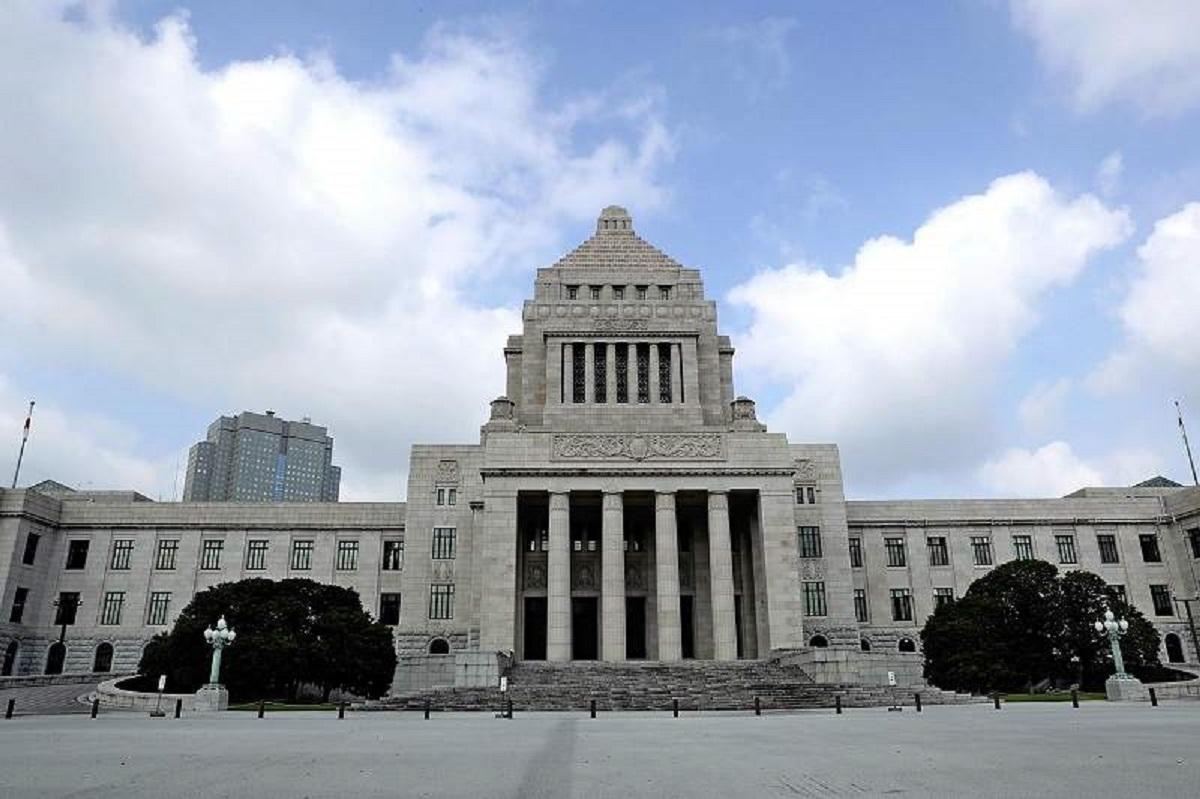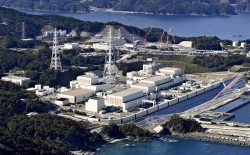
The Diet Building in Chiyoda Ward, Tokyo, Japan.
12:40 JST, March 10, 2024
Tokyo (Jiji Press)—While 13 years have passed since the March 2011 earthquake and tsunami, which caused a severe nuclear accident, the government of Prime Minister Fumio Kishida is moving toward restarting idled nuclear power reactors.
But a powerful earthquake that struck the Noto Peninsula in Ishikawa Prefecture, central Japan, on Jan. 1 this year reminded the country of the risk of a complex disaster, in which an earthquake or tsunami leads to a nuclear plant accident.
The New Year’s Day temblor occurred near Hokuriku Electric Power Co.’s Shika nuclear power station in the Ishikawa town of Shika.
Issues related to restarts of nuclear power reactors may come back as a major issue at the current regular session of the Diet, the country’s parliament, with opposition parties stepping up their criticisms of the current evacuation plans linked to possible nuclear accidents, pundits said.
The March 2011 disaster led to an unprecedented triple meltdown at Tokyo Electric Power Company Holdings Inc.’s Fukushima No. 1 nuclear plant in northeastern Japan.
Change Prompted by Decarbonization Drive, Weaker Yen
In 2012, the government, then led by the now-defunct Democratic Party of Japan, compiled a policy calling for ending nuclear power generation in the 2030s.
The current Kishida administration, which was launched in October 2021, has clearly shifted from the policy.
A basic policy for realizing green transformation, which was approved by the cabinet in February 2023, included plans to consider the promotion of the rebuilding of aged nuclear power reactors and the construction of new reactors.
In May 2023, a green transformation-related law that allows power utilities to operate nuclear reactors for effectively more than 60 years was enacted.
Kishida’s initiative to increase the use of nuclear power is aimed at reducing Japan’s dependence on coal-fired thermal power generation at a time when the United States and European countries are criticizing Japan for not being enthusiastic about tackling climate change.
Japan has been frequently given the Fossil of the Day award by Climate Action Network, a coalition of nongovernmental organizations tackling environmental issues. The award is given to countries CAN believes are slow to act in the fight against climate change.
A surge in fuel prices resulting from the yen’s depreciation is dealing a blow to Japanese households.
Kishida changed course also based on advice from people around him, including his secretary, Takashi Shimada, a former vice industry minister, who is known to be an advocate of nuclear power generation.
“This year, a number of nuclear power reactors may be brought back online,” a government official said.
Chugoku Electric Power Co. plans to restart the No. 2 reactor at its Shimane nuclear power station in Shimane Prefecture, western Japan, in August.
Tohoku Electric Power Co. is aiming to bring the No. 2 reactor at its Onagawa nuclear plant in Miyagi Prefecture, northeastern Japan, back online in September.
The government apparently envisions an early restart of a reactor at TEPCO’s Kashiwazaki-Kariwa nuclear plant in the central prefecture of Niigata.
“Nuclear power is an important noncarbon energy source,” industry minister Ken Saito said at a meeting of the Budget Committee of the House of Councillors, the upper chamber of the Diet, Japan’s parliament, on Thursday.
“We want to promote the use of nuclear energy” while thoroughly ensuring safety, he also said.
Pie in the Sky
At the Upper House Budget Committee meeting, a member of the main opposition Constitutional Democratic Party of Japan said, “Considering the Noto Peninsula earthquake, it may be impossible to change the nuclear policy.”
Many roads were cut off by the earthquake, and the transport of relief supplies to affected areas by air and sea did not go smoothly.
There were no radiation leaks from the Shika nuclear plant, while the quake measured upper 5, the fourth-highest level on the Japanese seismic intensity scale, under the power station. Facilities at the plant suffered damage from the quake.
The government’s guidelines on measures related to nuclear disasters stipulate that residents within 5 kilometers of a nuclear plant should evacuate in the event of an accident at the plant and that those within a radius of 5-30 kilometers should stay indoors first and then evacuate depending on the situation.
Seiji Osaka, executive deputy president of the CDP, told reporters that the evacuation plans do not take the possibility of a complex disaster into consideration. “It’s a pie in the sky,” he said.
Evacuation would be extremely difficult in the event of a complex disaster involving Shikoku Electric Power Co.’s Ikata nuclear plant in Ehime Prefecture, western Japan, and Japan Atomic Power Co.’s Tokai No. 2 nuclear plant in Ibaraki Prefecture, northeast of Tokyo, according to Osaka.
“The evacuation plans are made on the premise of residents’ exposure to radiation. This is a flaw that must not be ignored,” Osaka said.
An Inconvenient Truth
Taku Yamazoe, policy head of the Japanese Communist Party, also cast doubt on the evacuation plans.
He said: “Not only roads but also houses, schools and other facilities were damaged by the (Noto Peninsula) earthquake. The evacuation plans force residents to do what is impossible.”
In the quake, active faults moved jointly in an area spanning some 150 kilometers, wider than estimated by Hokuriku Electric, Yamazoe noted. “This shows limits of nuclear plant safety inspections. Plans to restart idled nuclear reactors should be scrapped,” he said.
After the earthquake, data from at least 18 monitoring posts to measure radiation levels around the Shika nuclear plant became unavailable.
Asked over how evacuation plans should be at a meeting of the Budget Committee of the House of Representatives, the Diet’s lower chamber, in February, Kishida said, “We will not promote the restart of reactors unless there are appropriate emergency response plans.”
But the Nuclear Regulation Authority’s work to review the nuclear disaster response guidelines will likely be limited to topics such as the timing of indoor evacuation, and there is no prospect of issues related to complex disasters being discussed.
“’An inconvenient truth’ for the government has emerged. This will be a focus in the latter part of the ongoing regular Diet session,” a senior CDP official said, showing an intention to grill the government over the advisability of restarting idled nuclear reactors.
Top Articles in Politics
-

Japan PM Takaichi’s Cabinet Resigns en Masse
-

Sanae Takaichi Elected 105th Prime Minister of Japan; Keeps All Cabinet Appointees from Previous Term
-

Japan’s Govt to Submit Road Map for Growth Strategy in March, PM Takaichi to Announce in Upcoming Policy Speech
-

LDP Wins Historic Landslide Victory
-

LDP Wins Landslide Victory, Secures Single-party Majority; Ruling Coalition with JIP Poised to Secure Over 300 seats (UPDATE 1)
JN ACCESS RANKING
-

Japan PM Takaichi’s Cabinet Resigns en Masse
-

Japan Institute to Use Domestic Commercial Optical Lattice Clock to Set Japan Standard Time
-

Israeli Ambassador to Japan Speaks about Japan’s Role in the Reconstruction of Gaza
-

Man Infected with Measles Reportedly Dined at Restaurant in Tokyo Station
-

Man Infected with Measles May Have Come in Contact with Many People in Tokyo, Went to Store, Restaurant Around When Symptoms Emerged


















